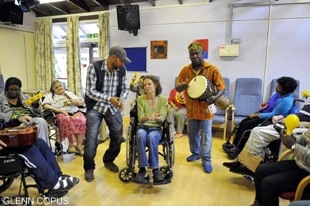
MS sufferer Caroline Smart found that playing an instrument helped her walk again. So she set up a music workshop to transform the lives of others.
Fifteen years ago, Caroline was working at the London School of Hygiene and Tropical Medicine when she was diagnosed with MS, a disabling neurological condition with no known cause or cure. After the diagnosis, she used a walking stick, then two walking sticks, until, at 40, no longer able to walk unassisted or do her job properly, she took early retirement.
The prognosis for her ever walking again was poor, but what happened next surprised everyone. She decided to pursue her passion for music and signed up to an Afro-Cuban music course at Hackney College where, contrary to doctors' predictions, she got better. Dramatically better.
“The incredible thing,” says Caroline, “was that after four years of studying and playing music, I could walk again. I could actually get from my home in Stamford Hill to Manor House Tube station 0.8 miles away entirely unassisted. I didn't even need my stick.”
It was a miraculous recovery. Caroline had left her stressful job to spend her days singing and drumming and felt “happier and physically stronger” than in years. She wondered if there was more to it: “I scoured the literature and I discovered a raft of research pointing to the benefits of rhythm for people with neurological problems.”
Music and Health is a once-a-week jam session run by a facilitator and a drummer. The 90-minute singing workshops are designed for disabled people, including those with multiple sclerosis and cerebral palsy, stroke patients, accident victims, and blind people. Almost all that attend this group — including Caroline — are confined to wheelchairs.
A £4,320 grant from the Evening Standard Dispossessed Fund to pay for the group's drummer and facilitator has secured its immediate future. The remarkable story of why Caroline started this group shows how something as basic as singing can have a transformative effect, especially on the lives of some disabled people.
“I noticed that before the music workshops I felt sluggish,” she recalls, “but that afterwards I was totally energised. I thought, if music can help me so much, surely it can help others, especially in Tottenham where two-thirds of people live on benefits.”
The grant from the Evening Standard Dispossessed Fund is “a godsend”, she says.
“Without it the group would fade away because we can't function without a facilitator.” Sayeed Zabbar, that same facilitator, boogies with everybody who's up for it, supporting each in turn to leave their wheelchairs, determination etched on their brows, for an improbable duet. “It's not just about the singing, it's about the community,” he says. “We've even seen love blossom in the group.”